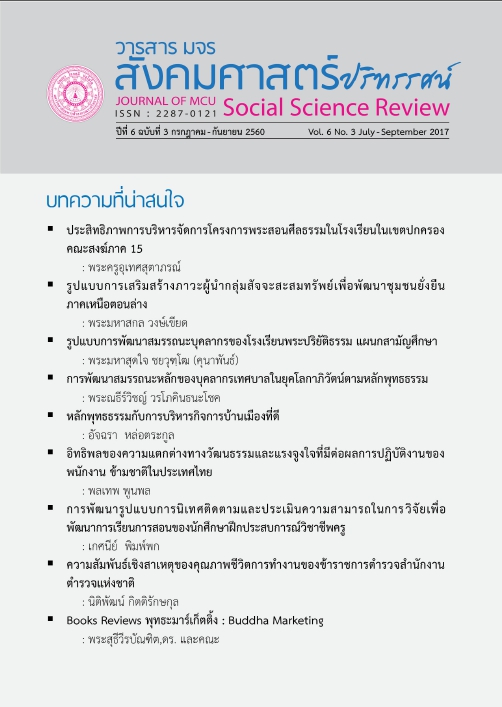ประสิทธิภาพการบริหารจัดการโครงการพระสอนศีลธรรมในโรงเรียน ในเขตปกครองคณะสงฆ์ภาค 15
คำสำคัญ:
ประสิทธิภาพ การบริหารจัดการ พระสอนศีลธรรมบทคัดย่อ
การวิจัยฉบับนี้ มีวัตถุประสงค์คือ 1) เพื่อศึกษาสภาพทั่วไปในการบริหารจัดการโครงการพระสอนศีลธรรมในโรงเรียน ในเขตปกครองคณะสงฆ์ภาค 15 2) เพื่อศึกษาปัจจัยที่ส่งผลต่อประสิทธิภาพการบริหารจัดการโครงการพระสอนศีลธรรมในโรงเรียน ในเขตปกครองคณะสงฆ์ภาค 15 และ3) เพื่อนำเสนอแนวทางในการพัฒนาประสิทธิภาพการบริหารจัดการโครงการพระสอนศีลธรรมในโรงเรียน ในเขตปกครองคณะสงฆ์ภาค 15
การศึกษาครั้งนี้ เป็นการศึกษาแบบผสานวิธี โดยใช้ระเบียบการวิจัยเชิงคุณภาพ ด้วยการวิเคราะห์เอกสาร การสัมภาษณ์เชิงลึกจากผู้ให้ข้อมูลสำคัญ ที่เป็นผู้บริหารโครงการพระสอนศีลธรรม และผู้บริหารสถานศึกษาจำนวน 18 รูป/คน และการสนทนากลุ่มเฉพาะ กับผู้เชี่ยวชาญจำนวน 12 รูป/คน และใช้ระเบียบวิธีวิจัยเชิงปริมาณ ด้วยการแจกแบบสอบถาม กับพระสอนศีลธรรมจำนวน 251 รูป สถิติที่ใช้ในการวิจัยคือ ค่าความถี่ ค่าร้อยละ ค่าเฉลี่ย ค่าเบี่ยงเบนมาตรฐาน และเปรียบเทียบความคิดเห็นของกลุ่มตัวอย่าง
ผลการวิจัยพบว่า
- สภาพทั่วไปของการบริหารจัดการโครงการพระสอนศีลธรรมในโรงเรียน ในเขตปกครองคณะสงฆ์ภาค 15 พบว่า (1) ด้านการบริหารงบประมาณ มีการบริหารจัดการอย่างโปร่งใส ตรวจสอบได้ แต่งบประมาณที่ได้รับการจัดสรรมีไม่เพียงพอต่อการจัดทำสื่อการเรียนการสอน
การจ่ายค่าตอบแทนให้แก่พระสอนธรรมศีลไม่เหมาะสมกับสภาพปัจจุบัน (2) ด้านการพัฒนาพระสอนศีลธรรม ในปัจจุบันมีการฝึกอบรมเป็นประจำทุกปีพระสอนศีลธรรมเป็นแบบอย่างที่ดีให้กับนักเรียน มีกระบวนการในถ่ายทอดความรู้การบูรณาการกับหลักพุทธธรรมได้อย่างเหมาะสม แต่พบปัญหาจำนวนพระสอนศีลธรรมมีไม่เพียงพอทุกสถานศึกษา จำนวนชั่วโมงเรียนมีจำกัด สื่อล้าสมัย ไม่เป็นที่สนใจของนักเรียน (3) ด้านการติดตามประเมินผล มีระบบและกลไกในการติดตามและประเมินผล แต่พระสอนศีลธรรมขาดการจัดทำทะเบียนผู้เข้าร่วมกิจกรรม ขาดความรู้และทักษะเกี่ยวกับวิธีในการประเมินผลงานจากแฟ้มสะสมงานของนักเรียน ขาดผู้นิเทศก์ในการให้คำแนะนำวิธีการสอนอย่างเหมาะสม - ปัจจัยที่ส่งผลต่อประสิทธิภาพการบริหารจัดการโครงการพระสอนศีลธรรมในโรงเรียน ในเขตปกครองคณะสงฆ์ภาค 15 นั้น พบว่า พระสอนศีลธรรมมีความคิดเห็นต่อประสิทธิภาพการบริหารจัดการโครงการพระสอนศีลธรรมในโรงเรียน ในเขตปกครองคณะสงฆ์ภาค 15 ในภาพรวมอยู่ในระดับมาก ( =4.10, S.D. =0.42) เมื่อพิจารณาเป็นรายด้านพบว่า อยู่ในระดับมากทุกด้านคือด้านการติดตามประเมินผล ( = 4.12, S.D. = 0.46) ด้านการพัฒนาพระสอนศีลธรรม ( = 4.11, S.D. = 0.46) ด้านการบริหารงบประมาณ ( = 4.08, S.D. =0.46)ส่วนปัจจัยที่สนับสนุนให้เกิดประสิทธิภาพในบริหารจัดการโครงการพระสอนศีลธรรมในโรงเรียน ในเขตปกครองคณะสงฆ์ภาค 15 คือหลักสัปปุริสธรรม 7 ประการ ได้แก่ความเป็นผู้รู้จักเหตุคือรู้จักสภาพปัญหาของโครงการ รู้จักผลคือรู้ความมุ่งหมายและวัตถุประสงค์ของโครงการ รู้จักตนคือมีความรู้ ความสามารถและคุณธรรม รู้จักประมาณคือรู้จักความพอดี และขีดความสามารถของโครงการ รู้จักกาลคือรู้กาลเวลาอันเหมาะสมและระยะเวลาในการบริหารจัดการโครงการ รู้จักประชุมชนคือการประสานงานเครือข่าย และทำงานเป็นทีม รู้จักบุคคลคือใช้คนให้ถูกกับงาน ซึ่งจะช่วยเสริมประสิทธิภาพในการบริหารจัดการโครงการพระสอนศีลธรรมในโรงเรียนให้ดียิ่งขึ้น
- แนวทางในการพัฒนาประสิทธิภาพการบริหารจัดการโครงการพระสอนศีลธรรมในโรงเรียน ในเขตปกครองคณะสงฆ์ภาค 15 พบว่ามี 4 ด้าน คือ (1)ด้านการบริหารงบประมาณ ได้แก่มีงบประมาณเพียงพอ การได้รับผลตอบแทนที่เหมาะสม การจัดหาผ้าป่าการกุศลสนับสนุน มีงบประมาณโรงเรียนสนับสนุน มีการวางแผนงบประมาณที่ดี มีการตรวจสอบจาก สตง. (2)ด้านการพัฒนาพระสอนศีลธรรม ได้แก่เปิดศูนย์ให้ความรู้เข้าถึงข้อมูลข่าวสาร มีการจัดบุคคลและสรรหาบุคลากรที่มีคุณภาพ มีการฝึกอบรมบุคลากรให้มีคุณภาพ ให้มีพระสอนศีลธรรมประจำทุกโรงเรียน จัดประชุมสัมมนาให้ความรู้บุคลากร หลักสูตร ป.สศ. มีการเขียนแผน (3)ด้านการติดตามประเมินผล ได้แก่จัดอบรมเพิ่มประสิทธิภาพในการวัดผล และประเมินผล จัดทำเอกสารหรือคู่มือเกี่ยวกับวิธีการประเมินผล โครงการพระสอนศีลธรรมจัดให้มีการวัดและประเมินผล สร้างความตระหนักให้ผู้บริหารสถานศึกษาในการวัดผล และประเมินผล จัดอบรมเชิงปฏิบัติการในการสร้างเครื่องมือวัดผลและประเมินผล (4)ด้านการพัฒนาเครือข่าย ได้แก่ร่วมกับคณะสงฆ์ในเขตพื้นที่รับผิดชอบ สำนักพุทธศาสนาประจำจังหวัดทุกจังหวัด วัฒนธรรมจังหวัดทุกจังหวัด สถานศึกษาทุกสถานศึกษา ศึกษานิเทศก์ทุกศึกษานิเทศก์ วิทยาลัยสงฆ์ทุกวิทยาลัยสงฆ์เพื่อพัฒนาโครงการพระสอนศีลธรรมให้มีประสิทธิภาพสูงสุด
เอกสารอ้างอิง
Department of Buddhism Education. (2012). Awarded Provincial Meditation Center. Bangkok: National Office of Buddhism Press.
Druck. Peter F. (2004). Management: Tasks responsibility practice. New York: Harper Row.
Herbert A. Simon. (2008). Administrative Behavior. New York: The Macmillan Company.
Herbert A. Simon. Donald W. Smithburg and Viotor A. Thompson. (2009). Public Administration. New York: Alfred A. Knope. Inc.
Herzberg. (2008). Melting experiment. New Brunswick. New Jercy.
John D.Millet. (2009). Management. New York: McGraw-hill book Company Inc.
Michael E.McGill. (2010). Organization Development for Operating Managers. New York: A Division of American Management Association.
Paul R.Lawrence. (2011). Developing Organization: Diagnosis and Action. Reading Mass:Addisonwesley Publising Co.
Phrakrusundaravajarakit (Boontham Dhammiko). (2015). The Mananagement Strategy of Human Resource of The Sangha in Petchaburi Province (Doctoral Dissertation). Mahachulalongkornrajavidyalaya University.
Phramahakangvan Dhiradhammo. (2015). Development of The Effective Management of Provincial Meditation Center (Doctoral Dissertation). Mahachulalongkornrajavidyalaya University.
Phrapaladvarunyoo Aggavajiro. (2015). The Management of Thai Monastery as the Community Center in Globolization Age (Doctoral Dissertation).Mahachulalongkornrajavidyalaya University.
Phrasamudravajirasophon (Sophon Dhammasobhano). (2014).The Development and Promotion of Arts and Culture of The Sangha in Samutsongkram Province (Doctoral Dissertation). Mahachulalongkornrajavidyalaya University.
ดาวน์โหลด
เผยแพร่แล้ว
รูปแบบการอ้างอิง
ฉบับ
ประเภทบทความ
สัญญาอนุญาต
ลิขสิทธิ์ (c) 2018 วารสาร มจร สังคมศาสตร์ปริทรรศน์

อนุญาตภายใต้เงื่อนไข Creative Commons Attribution-NonCommercial-NoDerivatives 4.0 International License.
เพื่อให้เป็นไปตามกฎหมายลิขสิทธิ์ ผู้นิพนธ์ทุกท่านต้องลงลายมือชื่อในแบบฟอร์มใบมอบลิขสิทธิ์บทความให้แก่วารสารฯ พร้อมกับบทความต้นฉบับที่ได้แก้ไขครั้งสุดท้าย นอกจากนี้ ผู้นิพนธ์ทุกท่านต้องยืนยันว่าบทความต้นฉบับที่ส่งมาตีพิมพ์นั้น ได้ส่งมาตีพิมพ์เฉพาะในวารสาร มจร สังคมศาสตร์ปริทรรศน์ เพียงแห่งเดียวเท่านั้น หากมีการใช้ภาพหรือตารางหรือเนื้อหาอื่นๆ ของผู้นิพนธ์อื่นที่ปรากฏในสิ่งตีพิมพ์อื่นมาแล้ว ผู้นิพนธ์ต้องขออนุญาตเจ้าของลิขสิทธิ์ก่อน พร้อมทั้งแสดงหนังสือที่ได้รับการยินยอมต่อบรรณาธิการ ก่อนที่บทความจะได้รับการตีพิมพ์ หากไม่เป็นไปตามข้อกำหนดเบื้องต้น ทางวารสารจะถอดบทความของท่านออกโดยไม่มีข้อยกเว้นใดๆ ทั้งสิ้น





